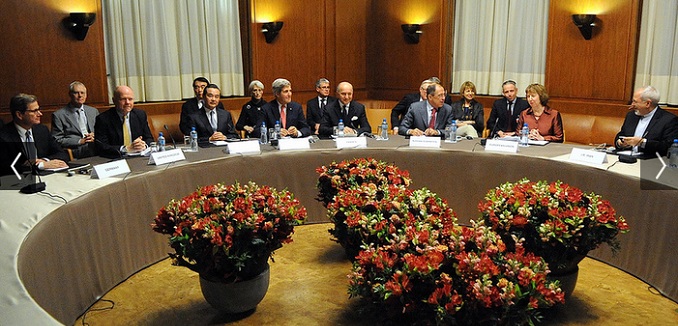Reuters reported late on Wednesday that efforts to implement the Joint Plan of Action (JPA) – the deal announced months ago in Geneva between the P5+1 global powers and Iran, which would set up a framework designed to facilitate still more negotiations between the parties over Tehran’s atomic program – have hit a snag. The JPA envisions a six-month period of talks, during which some sanctions on Iran will be lifted even as the Islamic republic is allowed to continue unlimited uranium enrichment to low levels of purity and continued work on the country’s plutonium production complex at Arak. Reuters reports that Iranian officials are also pressing to be allowed to pursue advanced uranium enrichment technology during the interim period, the upshot being that six months from now Tehran would have more enriched nuclear material and an enhanced capacity to quickly enrich that material further to weapons-grade purity. The scenario would be difficult to reconcile with characterizations of the JPA as even a temporary ‘freeze’ on Iran’s atomic ambitions – the key emphasis made by JPA defenders in Washington – and Western negotiators have pushed back.
Iran is already testing several different new, more efficient centrifuge models at its Natanz research facility, according to the U.N. nuclear watchdog. Iran’s statements last month that it was testing a new advanced centrifuge have not made clear whether it is an entirely new model or a modified version of an installed one.
Western diplomats said they were uncomfortable with the idea of Iran pressing ahead with the development of more advanced centrifuges. But Iran says centrifuge research is crucial. “We have to make sure our right to research and development is respected,” a senior Iranian government official said on condition of anonymity. The research and development would be aimed at improving Iran’s existing centrifuge technology so it can enrich better and faster, a prospect Western governments find worrisome.
The controversy risks further extending the time before the JPA takes hold. The so-called interim before the interim has effectively functioned as a window of immunity during which Iran has been allowed to continue its nuclear work unfettered by the agreement’s limitations, even as Western powers have held off on new pressure so as not to endanger future negotiations. The White House has already faced months of criticism for allowing itself to be maneuvered into such a situation, and denied yesterday that implementation talks had broken down.
“The P5+1 and Iran made progress in our discussions regarding the implementation of the Joint Plan of Action over the past several weeks,” White House National Security Council (NSC) spokeswoman Bernadette Meehan told the Washington Free Beacon when asked about the Reuters report. “The discussions broke for the holidays, and the teams took a few outstanding points back to capitals,” Meehan said. “We expect to finalize the implementation plan soon.”
Iranian media yesterday reported that Mohammad Hassan Asafari, a member of the National Security and Foreign Policy Commission in Iran’s parliament, declared that in addition to refusing to ever give up enrichment, Iran would also refuse to give up “one iota” of its support for terrorist groups such as Hezbollah.
[Photo: U.S. Department of State / Flickr]




